Your Cart is Empty
Hands Behind the Jewelry:
Ibu Leni the Gold Miner
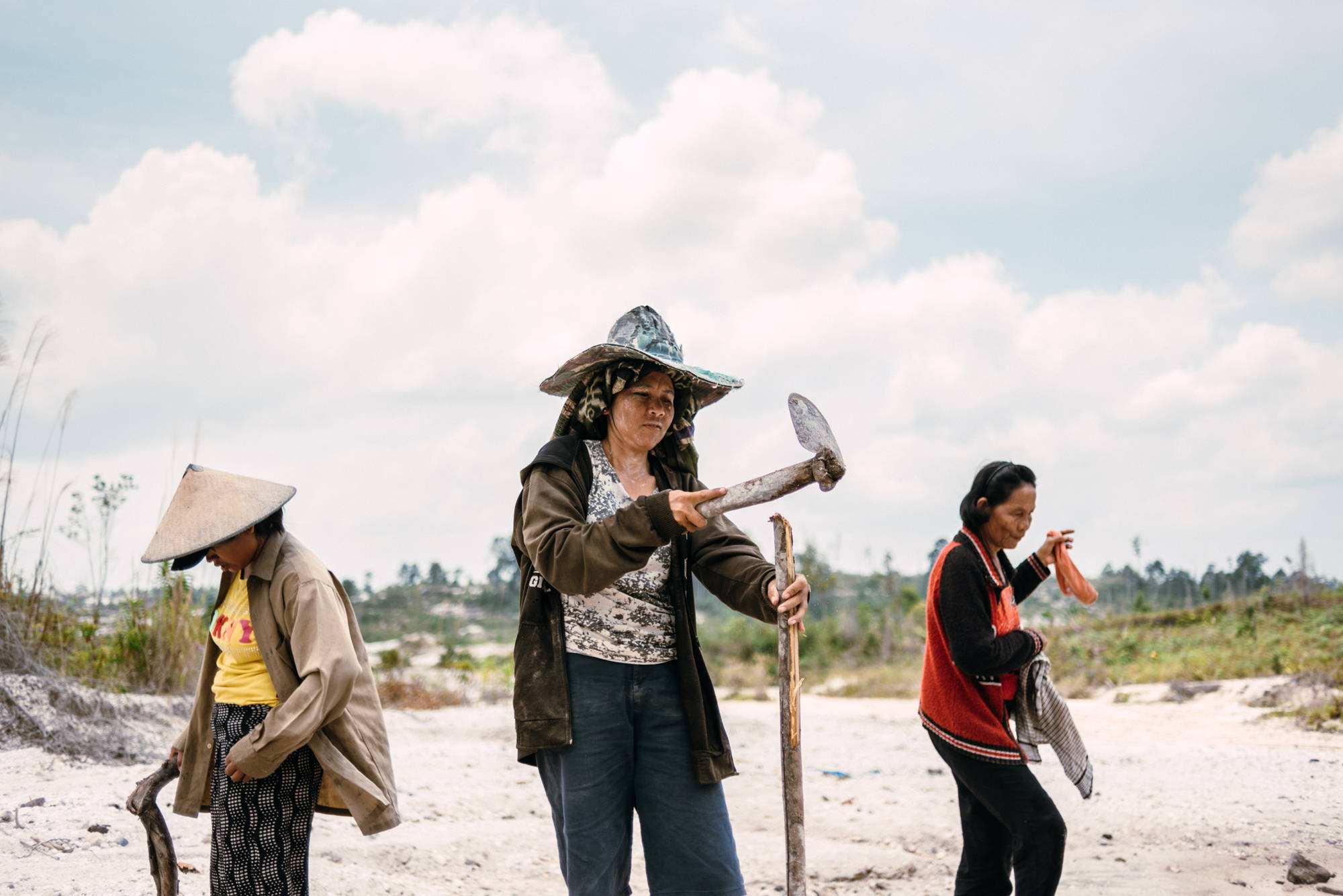
Once upon a time, there was a village filled with brilliant gold miners who have mined gold for generations. They lived in the heart of Kalimantan (Indonesian Borneo), and I feel so lucky to have met them.
Her long, deep-black hair was tucked gracefully to one side of her shoulder. It was a sun-soaked afternoon when I met Ibu Leni in her humble tin-roofed kitchen that traps heat like an oven. In her unique, humorous tone and with a face shining with a friendly glow, she introduced herself to me.
“My name is Leni Marlina. My nickname is Ina. My more special nickname is Epit. Mama Epit, people call me after my oldest son.”
We’ll stick to Ibu Leni (ibu is Indonesian for Mrs. Honorifics are usually used to be polite). I met this warm-hearted lady on my first trip to meet the group of women miners in Central Borneo that have become one of our partners. She heads a village mining group under YTS’s guidance in Kalimantan. The group that’s been delivering us the ethical, mercury-free gold that we turn into beautiful jewelry pieces you love.
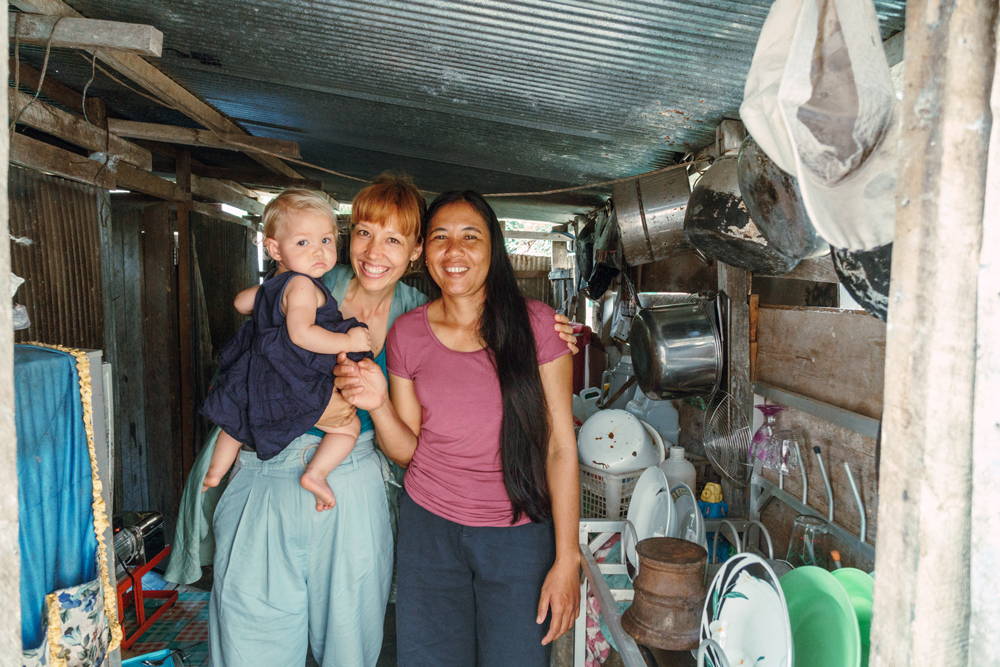
Me, my daughter, and Ibu Leni at her kitchen where this interview took place
Ibu Leni, tell me about your family.
My husband doesn’t have a permanent job. He goes hunting, he works in the fields, he farms, and sometimes he also mines for gold. I work as a gold miner when the kids are off to school. I’ve never worked a real job before, though I’ve been mining gold with my parents since I was a kid. Before this, I also worked in the fields as a farmer, moving from one field to another. In a way, it was like gold mining, because we move from creek to creek, to look for the ones that have gold in it.
How do you find the right river to mine gold?
We used to walk very far from one river to the other looking for gold. But now we have motorbikes, so we can go there easily. That’s one of the things that has changed since YTS and Gardens of the Sun came here.
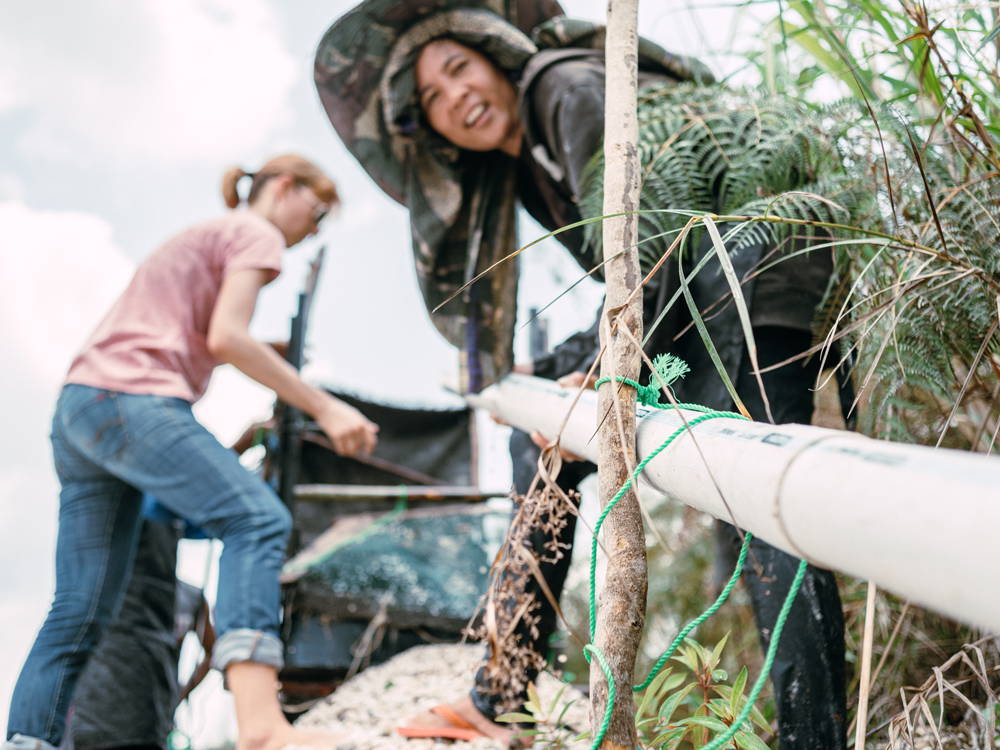
Using the dredging machine (locally known as "mesin tower") to extract gold from the river.
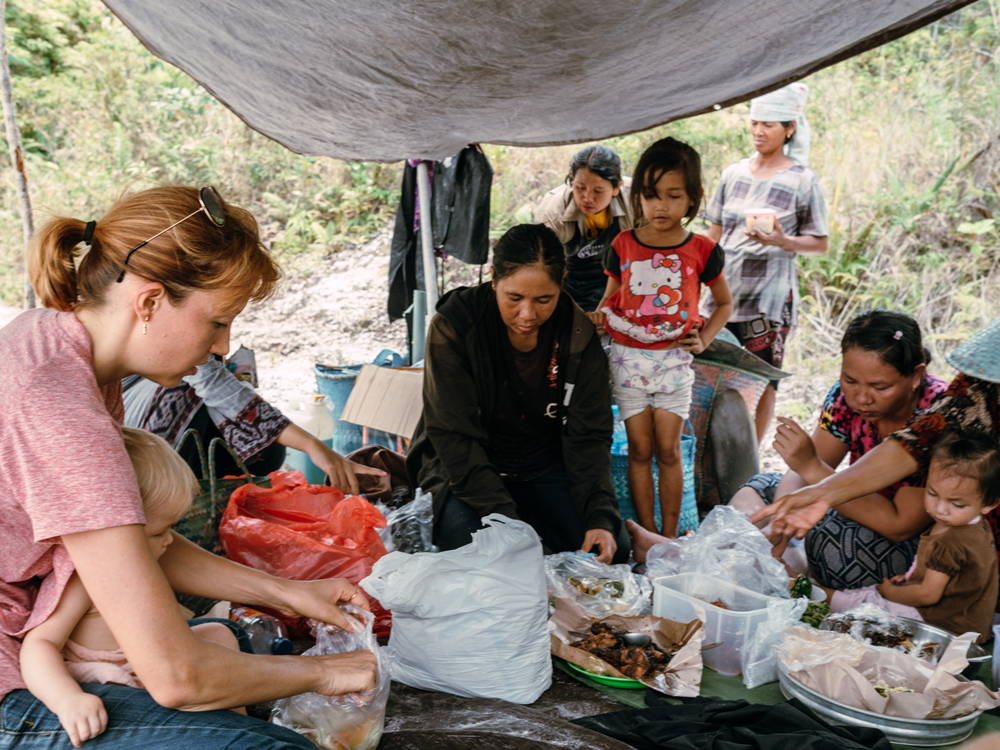
Lunchtime! Our kids joined us for lunch during our break, too.
I’m so glad to hear that. What else has changed?
We used to use mercury to separate gold from other metal and dirt, now we don’t anymore. We’ve gone back to using the traditional way to mine, the way that our ancestors did. We tried using a more sophisticated machine to help us work instead of only panning, but it’s heavier labor than gold panning. So I continue to use my hands and wooden pan to extract gold. I don’t use any mercury in the process, same like my grandmother. Since around 2005, most people in our area started using mercury to make the process of separating the gold faster.
Recently, we learned that it’s a dangerous way to mine gold. YTS came here to explain why it’s bad for us to use mercury. They explained that we might not feel the effects now, but that we might see it in the future. Particularly us women, and it would affect our children too. So we stopped using mercury.
Could you tell me more about the women-miners group that you’re a part of?
YTS came to our village, Tewang Pajangan, in 2017. They wanted to help us use better mining processes. They educated us and helped women here to mine gold safely. They gave us a mesin tower (dredging machine) so we could get more gold. We can extract more gold with the machine, which resulted in more income. But we also had higher cost to fuel the machine, and physically it was a lot more demanding than panning. So for now we’re not using it, but panning by hand.
Apart from the premium price we now receive from Gardens of the Sun for our gold, we were also interested in the educational and developmental benefits. So we created this group, and I’m grateful we did it.
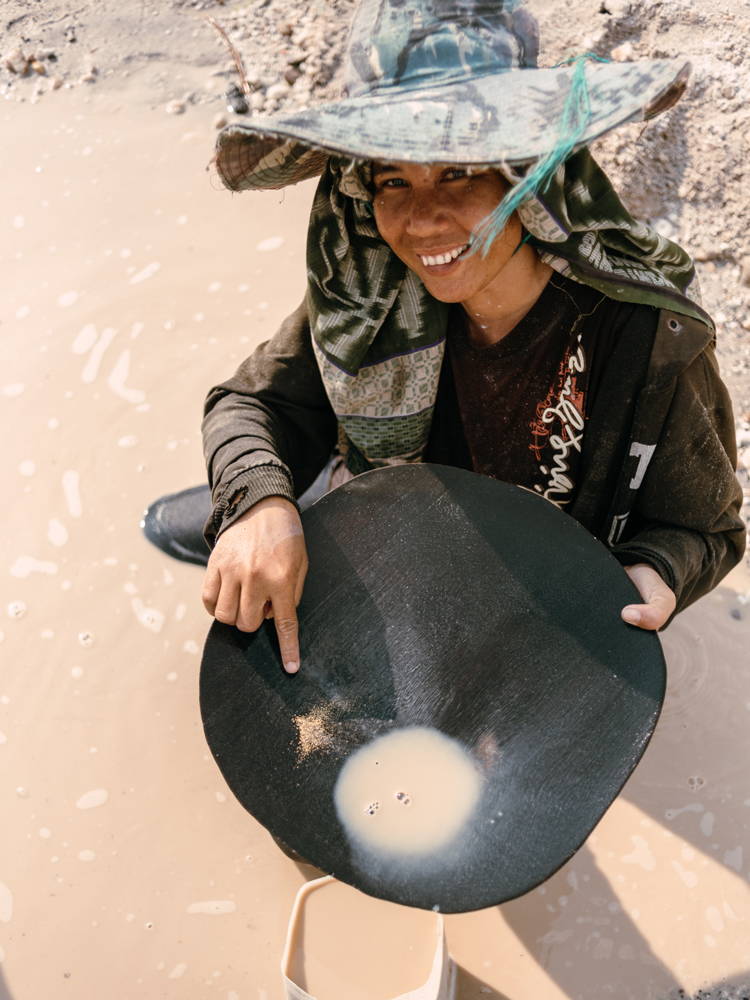
Ibu Leni showing us gold particles on the panning tool her ancestors used to use too!
How’s the situation for the mining families now?
After we joined the cooperative, it feels like things are improving. A lot of the miners have family situations similar to mine. We need a little help. Some have many children; Ibu Mini, for example, has 9 children, Ibu Gineng has 8 kids, some others have maybe 2 or 4 children, and now all our kids go to school. I’m happy that all of us are able to afford school tuition, because many of our husbands don’t have a full-time job.
Ibu Gineng’s husband for instance, had a stroke, and Ibu Icing’s husband is so old he can’t work much now. The additional income from gold mining has really helped out with our situations.
What’s your dream?
My dream is simple. I want to have a better home... a place where we can live comfortably. To have my kids finish school. I hope they can also go to university, to be successful - I want them to be more successful than me. Most children here finish high school, some of them even got their Bachelor degree. I’m proud of that.
As for myself, I dream of traveling to Bali one day. I want to have a holiday and go around the island. I’ve only been to Palangkaraya. I want to go to Jakarta, too. I’ve never been there, let alone abroad! But it’s my dream, maybe one day it will happen. I used to dream of having a motorbike. And now we have a motorbike. Now we can go to places that are far, further than before, further than we could go on foot. So maybe my other dreams will come true.
Our interview ended; it was time for us to go to the mining site. Joining the women for work that day, I got to experience a part of their life. To work with them, meeting their family, and seeing the impact that you help us create in their life, I’m very proud to have you as a part of this journey. This year, we’ll continue to grow and touch more lives than ever before, and it’s all thanks to you that we get to do this! Stay tuned, and see where we’ll move forward.
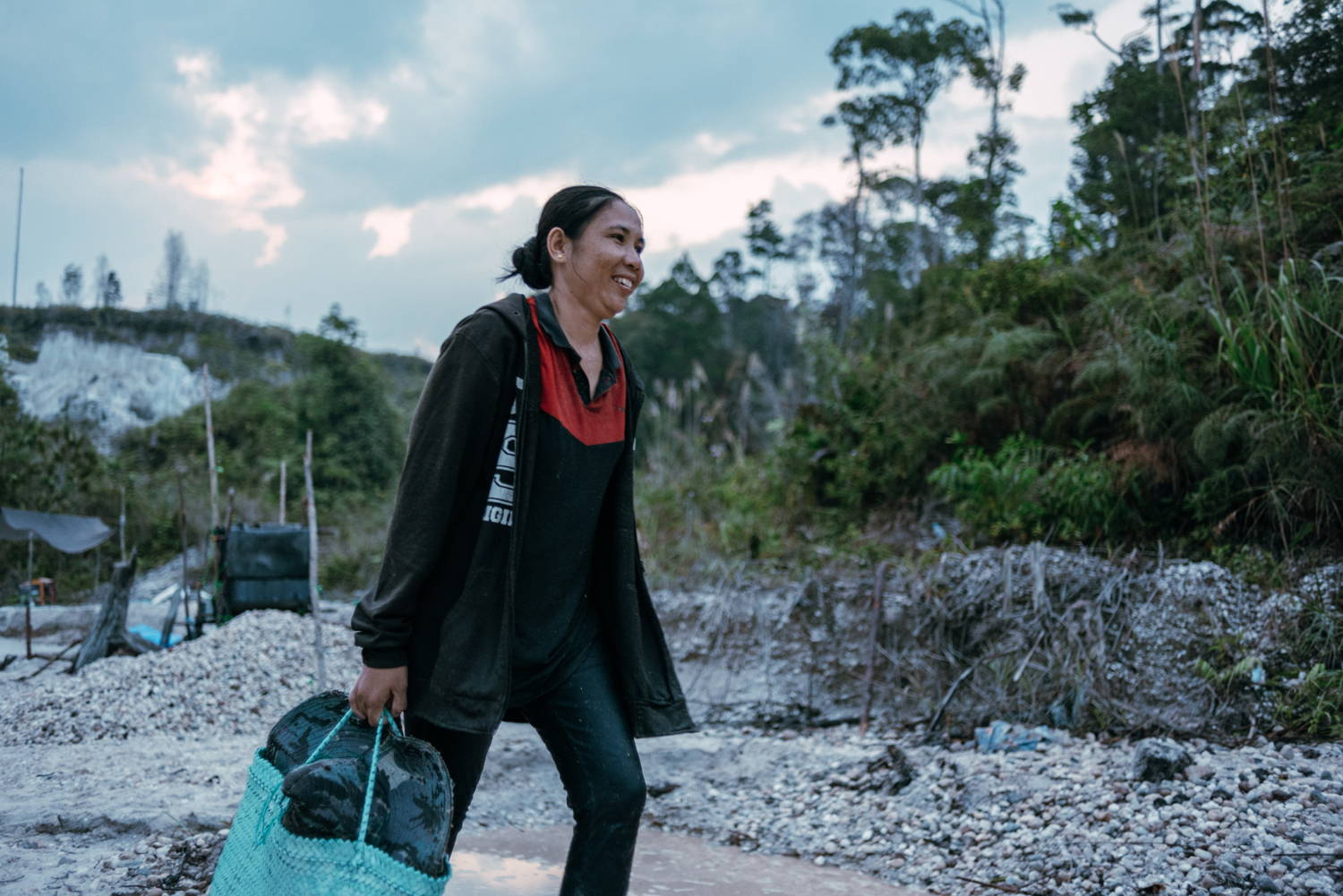
Ibu Leni on her way back home at the end of a long day
BTW, have you read our 2019 impact report yet? Check it out here.










